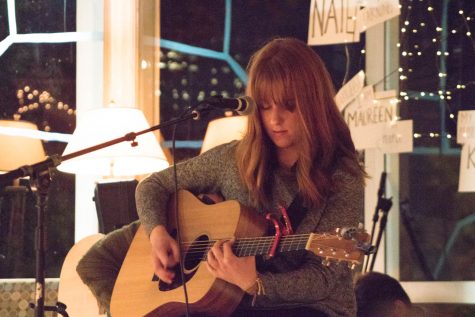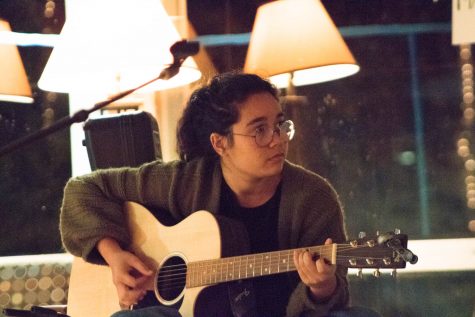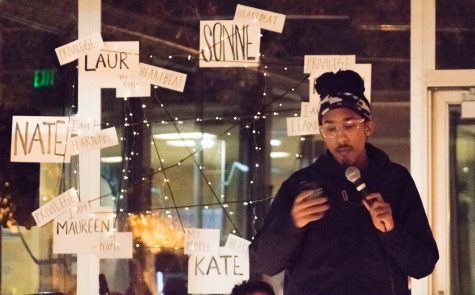Differing beliefs, same cause
Making space for respectful political discussion
November 6, 2019
In the center of a “stage” outlined by gold string-lights in the dimly lit Hill Hall lounge, Hill Hall Council Social Justice Director and Intercultural Coordinator Laur Lugos and her roommate Kate Bischoff shared words of support and love.
Moments before, they each performed original songs. Their songs expressed opposing beliefs on abortion. At the end of the event, after Lugos had thanked the audience for coming, Bischoff — the president of Seattle Pacific University’s Students for Life club — grabbed the microphone to congratulate her roommate and express her pride in Lugos.

Kate Bischoff at the Listen event in Hill Hall on Nov. 1st.
“I love you!” she finished, after the applause from her congratulation had died, and heard an equally enthusiastic “love you!” back. The pair was the epitome of the idea Lugos was hoping to encourage: understanding and listening despite difference.
In front of them, the lounge was full of students. “Listen,” on the evening of Friday Nov. 1, was an event designed to create conversation around different perspectives on issues in hope that students can better listen to, and hear, one another.
Joining Lugos and Bischoff on stage sat artists of all different beliefs and ideologies. That was not by accident. Lugos brought every artist together with the purpose of hearing and facing their differences head-on.
“I know how easy it is to get caught up in the flood of hurt and injustice that we see all around us,” read the forward of the event’s program, written by Lugos. “But we hold so much more power when we choose to listen to each other, believe in each other, and work together.”
“If our liberties are tied, we better start acting like it. The next hour is just the beginning,” it continued.

Laur Lugos playing guitar during the Listen event in Hill Hall on Friday Nov. 1st
Throughout the event, different artists performed pieces that reflected their points of view on a current issue. The artists featured included Lugos, Bischoff, Sonne Brown, Nate Canny, Rebekah Huber, Maureen Dixson and Toni Lee.
Between these artists, the audience experienced a variety of mediums, from poetry to instrumental guitar to song. With varying perspectives, the intention was to encourage understanding.
Lugos and her Bischoff’s opposing beliefs were origin of Lugo’s idea to encourage listening and acceptance, and they served as a perfect example of it during the event.
Lugos performed a piece regarding her wrestling with issues of abortion and what to believe about the concept of ‘life.’ Soon after, Bischoff performed a pro-life piece after announcing her psition as the president of SPU’s Students for Life club.
Lugos’ song focused on power and privilege and the complexity of the issue, while Bischoff’s viewpoint emphasized disabilities and the factors of the disabled community that participate in the conversation. Just moments before her pro-life song (titled “Little Miracle”), Bischoff sang about her experiences living with autism.
Many topics were discussed by more than one performer, but from different viewpoints.
Brown, one of the performers who showcased more than one piece, read his poetry. One piece tackled themes of toxic masculinity, others dealt with issues of racism, another with politics and the current presidential administration.
In one poem, titled “Flower Boy,” which discusses themes of masculinity and breaking the stereotypes often associated with it in the U.S., Brown said “chased away from what I found pretty I recall I must be ‘A Man’/ Pressure builds and stacks, pretty voids my vocabulary and I am left ‘A Man.’”

Sonne Brown sharing poetry at Listen in the Hill Hall lounge on Friday, Nov. 1st.
Canny, by contrast, did not say anything during his performance about gender. He prefaced it by explaining that he was going to play instrumental guitar, and that he uses it to express his emotions.
“Guys aren’t supposed to feel emotions. They aren’t,” Canny said. “They can’t feel anything, gotta be tough. So, I’m going to practice vulnerability and I’m about to feel a lot in front of you guys,” Canny said.
Dixson played piano while she both sang and spoke lines she had written about being mixed race, and the racism she sees around her. She played two pieces, titled “Melanin” and “Identity.”
“Melanin,” the first performance of the night, began with the line “Martin didn’t die for this,” which she repeated several times throughout the piece. It discussed the use of sterotyping and racist rhetoric toward Black and biracial people, and racism in America at large.
In “Identity,” Lee joined her as a vocalist in a piece that discussed finding identity as a multiracial person and included the repeated line, “I’m running free,” sung by Lee as Dixson spoke about wanting to be happy with herself despite the odds.
By contrast, Rebekah Huber read prose poetry that told the story of her experience as a white person living in Indonesia, feeling ostracized and like an “exotic bird.”
“Look, there’s the white girl,” she read. “There’s that outsider, foreigner, whose skin tells us she doesn’t belong/ even before her accent can.”
The piece ended with her realizing the complex racial dynamics of the U.S. once she moved back, and the delicate balance that she now navigates in sharing her story. She emphasised that she is always learning how to understand all perspectives better.
“Still trying to figure it all out/day by day, step by step, mistake by mistake by mistake.”
























































































